3 reasons why Squid Game became so popular
The phenomenon of Hwang Dong-hyuk's bombastic and resonant K-drama came as a sudden culture shock. But why has it become so popular?
Lee Jung-jae in Squid Game, Netflix (Photo: Netflix)
The now-ubiquitous culture of Squid Game seemed to come from nowhere. Who could've predicted that a new nine-part, South Korean thriller would be enjoyed by over 140 million households around the world? Not even the likes of Bridgerton and Lupin could compete. It’s now on track to beat them both in terms of total hours watched. And since its discreet release on 17 September, social
media has been filled with references: engendering memes and
TikToks and Halloween recommendations.
Squid Game’s popularity is even more surprising given how genuinely good it is. Unfurling like a lethal mixture of Battle Royale, The Truman Show, and Saw, the series isn’t a guilty pleasure – it’s riveting, shocking, and crushing. But how has it reached this seemingly impossible feat in television? Here are three possible explanations.
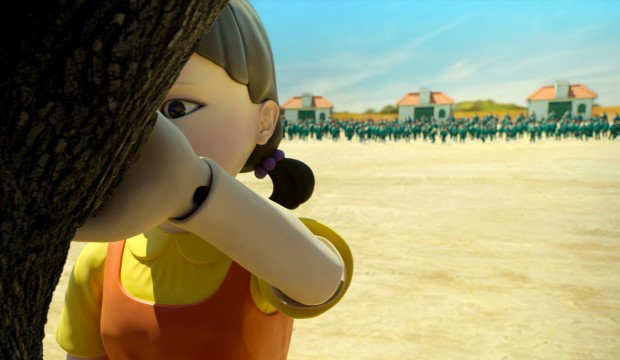
Photo: Netflix
The story is gripping and universal
Set in South Korea, people at their lowest financial ebb – in debt or destitute – are recruited by dodgy men in suits. If the indebted citizens accept an ominous offer, they’re subsequently thrown into a car, drugged, and taken to a mysterious island. And on the island, they’re made to play several rounds of amplified children’s games with over 400 players. The twist? They’re playing to the death. And every death adds to the winning jackpot, which is dangled in a massive piggy bank above their beds.
Naturally, this isn’t the most realistic of scenarios. But the K-drama – a globally embraced genre that’s surged in popularity with the general wave of Korean culture – often likes to test those limits. These stories reach beyond what many Western shows and movies would risk.
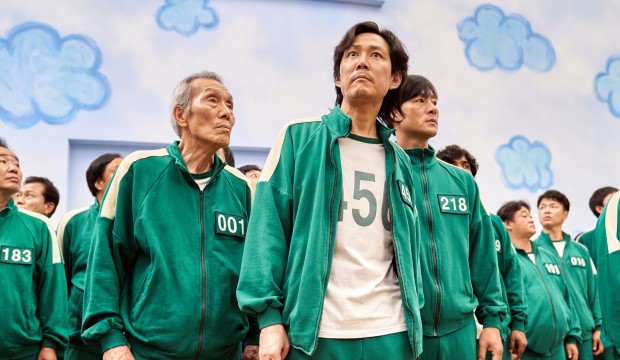
Oh Young-soo, Lee Jung-jae, and Park Hae-soo. Photo: Netflix
In a Variety interview with writer/director Hwang Dong-hyuk, he describes his desire to write 'characters we've all met in real life'. The series dives into the thickly constructed stories of a divorced father with a gambling addiction, a Pakistani immigrant, a North Korean defector, a wealthy businessman who’s lost all the company’s money, and a lovable elderly gentleman. All these players take extremely dark turns, but you can’t help putting yourself in their tracksuits and trainers
Squid Game also makes you realise the universality of various kids’ games. Although there are some (including the titular game) that are region-specific, many of the premises are instantly familiar. The opening game Red Light, Green Light is pretty much the Korean equivalent of What’s the Time, Mister Wolf?, but with machine guns. (There are equally violent versions of marbles, hopscotch and tug of war.)
Hwang continues, ‘The games portrayed are extremely simple and easy to understand. That allows viewers to focus on the characters, rather than being distracted by trying to interpret the rules.’
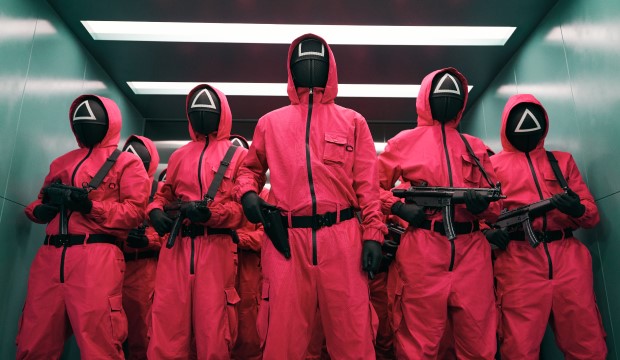
Photo: Netflix
The visuals, costumes, and set designs are unforgettable
This writer wasn’t joking about Halloween recommendations. During this spooky season, many are searching online for a Squid Game costume. The simplicity of the players' attire is appealing, but the vivid weirdness of the soldiers' gear has its own fatal attraction.
As well as their weapons, the soldiers wear pink jumpsuits and opaque black masks. The masks are painted with a triangle, square, or circle, which signifies rank. But although this outfit creates the effect of inhumanity – a kind of robotically violent servitude – Hwang often directs the soldiers' movements with fascinating idiosyncrasies. And although these soldiers rarely take off their masks (for good reason), you can tell there’s a human face under there.

Photo: Netflix
The bubblegum colours nurture the series' incredible surrealism: the abhorrent games clash against a bizarrely childish setting. At one point, you see The Empire of Light, a René Magritte painting that lingers in a twilight between real life and fantasy – creating a sense of dark unease (William Friedkin used the same painting as inspiration for The Exorcist). Squid Game pursues similar levels of distorted reality.
As the players walk to their next game, Hwang and art director Chae Kyung-sun also evoke the artist M C Escher and his engravings of infinite staircases. But here, in keeping with the childish dynamic, they're splashed with deep pinks and lime greens.
The story of Squid Game attacks you with its bloody details, but the cinematography, costumes, and set designs are a polychromatic assault on the senses. And with the designs of the various challenges, built with purposeful exaggeration and unpredictability, this is a spectacularly visual experience.
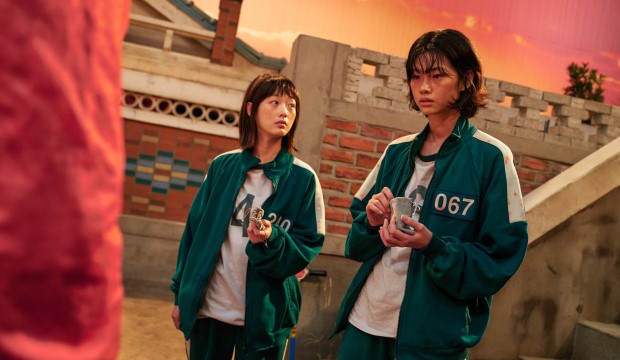
Lee You-mi and Jung Ho-yeon. Photo: Netflix
The scrutiny against capitalism resonates
According to various polls, an increasing number of younger people are decrying capitalism – especially in regard to housing crises and the climate emergency. Like many K-dramas, particularly the Oscar-winning Parasite, Squid Game dismantles these oppressive systems in such bombastic ways. And what’s the core demographic subscribed to Netflix?… 18- to 34-year-olds.
The facilitating forces at the top watch the players' suffering and it's even converted into entertainment, as seen when the nauseating 'VIPs' turn up. They observe the antagonistic tribalism that results from their efforts. But as is clear from the depressing second episode, Hell, the horrors of the game become preferable to the players' situations in the outside world. Competing to the death for a chance to live with wealth is better than trying and failing the usual way.
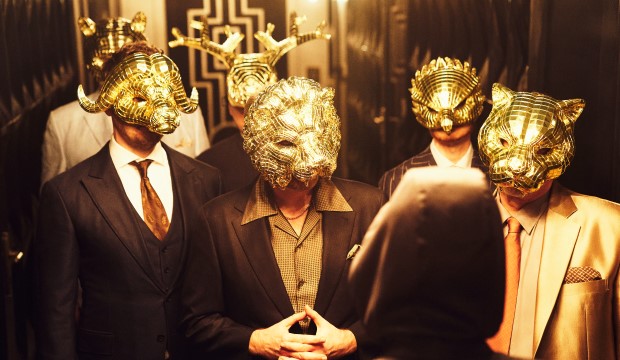
The nauseating 'VIPs'. Photo: Netflix
Although the series is not utterly pessimistic, it’s a frightening psycho-social depiction of humanity. As fear settles in, the players form separate subgroups and their personal prejudices take over. Women, non-Koreans, the elderly, and the disabled are ostracised: they’re seen as a threat. Considering the real-life marginalising of many groups around the world, this can’t help but resonate.
It’s hard to imagine Hollywood daring the same scrutiny, which can inspire great change. Recently, 80,000 protestors across South Korea took to the streets wearing Squid Game masks – demanding better working conditions from the government. This show has power.
Squid Game is available to watch on Netflix.
Squid Game’s popularity is even more surprising given how genuinely good it is. Unfurling like a lethal mixture of Battle Royale, The Truman Show, and Saw, the series isn’t a guilty pleasure – it’s riveting, shocking, and crushing. But how has it reached this seemingly impossible feat in television? Here are three possible explanations.

Photo: Netflix
The story is gripping and universal
Set in South Korea, people at their lowest financial ebb – in debt or destitute – are recruited by dodgy men in suits. If the indebted citizens accept an ominous offer, they’re subsequently thrown into a car, drugged, and taken to a mysterious island. And on the island, they’re made to play several rounds of amplified children’s games with over 400 players. The twist? They’re playing to the death. And every death adds to the winning jackpot, which is dangled in a massive piggy bank above their beds.
Naturally, this isn’t the most realistic of scenarios. But the K-drama – a globally embraced genre that’s surged in popularity with the general wave of Korean culture – often likes to test those limits. These stories reach beyond what many Western shows and movies would risk.

Oh Young-soo, Lee Jung-jae, and Park Hae-soo. Photo: Netflix
In a Variety interview with writer/director Hwang Dong-hyuk, he describes his desire to write 'characters we've all met in real life'. The series dives into the thickly constructed stories of a divorced father with a gambling addiction, a Pakistani immigrant, a North Korean defector, a wealthy businessman who’s lost all the company’s money, and a lovable elderly gentleman. All these players take extremely dark turns, but you can’t help putting yourself in their tracksuits and trainers
Squid Game also makes you realise the universality of various kids’ games. Although there are some (including the titular game) that are region-specific, many of the premises are instantly familiar. The opening game Red Light, Green Light is pretty much the Korean equivalent of What’s the Time, Mister Wolf?, but with machine guns. (There are equally violent versions of marbles, hopscotch and tug of war.)
Hwang continues, ‘The games portrayed are extremely simple and easy to understand. That allows viewers to focus on the characters, rather than being distracted by trying to interpret the rules.’

Photo: Netflix
The visuals, costumes, and set designs are unforgettable
This writer wasn’t joking about Halloween recommendations. During this spooky season, many are searching online for a Squid Game costume. The simplicity of the players' attire is appealing, but the vivid weirdness of the soldiers' gear has its own fatal attraction.
As well as their weapons, the soldiers wear pink jumpsuits and opaque black masks. The masks are painted with a triangle, square, or circle, which signifies rank. But although this outfit creates the effect of inhumanity – a kind of robotically violent servitude – Hwang often directs the soldiers' movements with fascinating idiosyncrasies. And although these soldiers rarely take off their masks (for good reason), you can tell there’s a human face under there.

Photo: Netflix
The bubblegum colours nurture the series' incredible surrealism: the abhorrent games clash against a bizarrely childish setting. At one point, you see The Empire of Light, a René Magritte painting that lingers in a twilight between real life and fantasy – creating a sense of dark unease (William Friedkin used the same painting as inspiration for The Exorcist). Squid Game pursues similar levels of distorted reality.
As the players walk to their next game, Hwang and art director Chae Kyung-sun also evoke the artist M C Escher and his engravings of infinite staircases. But here, in keeping with the childish dynamic, they're splashed with deep pinks and lime greens.
The story of Squid Game attacks you with its bloody details, but the cinematography, costumes, and set designs are a polychromatic assault on the senses. And with the designs of the various challenges, built with purposeful exaggeration and unpredictability, this is a spectacularly visual experience.

Lee You-mi and Jung Ho-yeon. Photo: Netflix
The scrutiny against capitalism resonates
According to various polls, an increasing number of younger people are decrying capitalism – especially in regard to housing crises and the climate emergency. Like many K-dramas, particularly the Oscar-winning Parasite, Squid Game dismantles these oppressive systems in such bombastic ways. And what’s the core demographic subscribed to Netflix?… 18- to 34-year-olds.
The facilitating forces at the top watch the players' suffering and it's even converted into entertainment, as seen when the nauseating 'VIPs' turn up. They observe the antagonistic tribalism that results from their efforts. But as is clear from the depressing second episode, Hell, the horrors of the game become preferable to the players' situations in the outside world. Competing to the death for a chance to live with wealth is better than trying and failing the usual way.

The nauseating 'VIPs'. Photo: Netflix
Although the series is not utterly pessimistic, it’s a frightening psycho-social depiction of humanity. As fear settles in, the players form separate subgroups and their personal prejudices take over. Women, non-Koreans, the elderly, and the disabled are ostracised: they’re seen as a threat. Considering the real-life marginalising of many groups around the world, this can’t help but resonate.
It’s hard to imagine Hollywood daring the same scrutiny, which can inspire great change. Recently, 80,000 protestors across South Korea took to the streets wearing Squid Game masks – demanding better working conditions from the government. This show has power.
Squid Game is available to watch on Netflix.
TRY CULTURE WHISPER
Receive free tickets & insider tips to unlock the best of London — direct to your inbox
| What | 3 reasons why Squid Game became so popular |
| Price | £n/a |
| Website | Click here for more information |